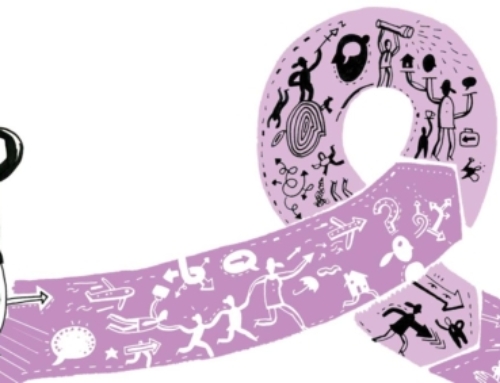The intention
The story of CEO David Pottruck is essentially a story of many;
You are fired overnight from a position that was a big part of your daily reality and identity. In the period that follows you go through the following phases to a greater or lesser extent:
- Shock and disbelief
- Realize
- Healing
- Start over
David Pottruck (57) what dead 19 July 2004 de CEO van Charles Schwab Corporation, one of the largest financial services companies in the United States. The company has a customer portfolio of more than $1 trillion and over 13.000 people employed.
His intention was to, partly due to an aggressive acquisition policy, expand further and further increase the share price.
The approach
Pottruck had the company in 20 help build years of time, first as president, then as co-CEO of founder Schwab and the latter 14 months as CEO. As CEO, he didn't exactly have the wind in his favor..
The market and the dotcom crashes brought an abrupt end to much of the active trading vital to Schwab. Pottruck tried to turn the tide, among other things through a range of takeovers. His aggressive acquisition strategy did not bear the desired fruit. The share price stalled well below its all-time high $ 50,17 in 1999.
In the end, Pottruck felt compelled to 8.000 to fire employees. The proud company culture, that Pottruck had helped to create was seriously dented by this 'mass layoff'.
The result
On 19 July the board of directors suddenly called an 'executive' meeting, something that usually only happens at the end of a meeting. The words of founder Charles Schwab, ended a 20-year corporate career in less than 20 seconds. Pottruck remembers Schwab saying “the management team has lost confidence in the direction of the company and in your leadership.” The resignation took effect immediately.
Pottruck was stunned. Not about the resignation itself – he was well aware of the company's poor performance and position – but of the way he was fired on the spot.
The self-made son of a worker at the Grumman Aircraft factory got a new one, much less attractive, identity; he was just the next CEO who couldn't keep his head above water when bad weather came.
The lessons
Why should we feel empathy for a man who received an exorbitant pay while at the same time the company was stagnating?
What could each of us possibly have in common with a man whose net worth is about half a billion dollars and for whom meetings with senators and trips on a private jet were daily reality?? Perhaps more than we think. International competition and economies of scale and the increase in mergers and acquisitions are making forced redundancies an increasing reality.
And we may not be in the spotlight as much as a fired CEO. We are also very likely not to leave with a comparable reward or golden handshake. But coping with a sudden dismissal from a position that is a big part of your identity and daily reality, goes the same pattern for many people.
- Shock and disbelief: The first reaction to a loss is an intoxicated feeling and the individual's refusal to recognize the reality of the loss. Pottruck felt ashamed and humiliated. He was no longer the CEO of a financial services company with a revolutionary growth scenario.
- Realize: Awareness of loss creates feelings of emptiness, frustration, fear and despair. For someone who enjoyed his leadership position, this public beheading was a great humiliation. The following comment from Intel's Andy Grove helped him immensely: “Do you think the fact that you are no longer CEO of Schwab, means you are no longer a better person?” You are as good as a person as you were a week ago. Keep your head high.”Pottruck came to an important decision. Instead of blaming others, he decided to take responsibility for the things he had done wrong. He wanted to deal with this defeat better than he had during other dark periods in his life, like his two divorces.
- Healing and Recovery: At this stage, the various rituals associated with loss within a culture are performed. The end of a career is hard, sometimes this is reinforced by the lack of a real closure. Pottruck was lucky enough to receive a lot of support from former employees, friends and family. An acquaintance shared his own dismissal experience: “take your time,” he wrote. “Close the door firmly behind you and don't look back”.”There will be mourning”, said Howard Morgan, a leadership consultant who has worked with Pottruck and other fired drivers. “But successful people let the past go as fast as they can”. You can't grieve and start over at the same time, because that pulls down the new beginning.”The first 6 For months Pottruck had some sort of post-Schwab stress syndrome”, he says. “The first tendency is to try to recreate the old life. Later there was more time for reflection. He realized that at Schwab he was happiest when the company was still small and he was more able to take risks.”It was clarified to think about what you've done and what you could have done better.” So he regrets that he never anticipated worse times. He also realized that the sheer number of projects he launched prevented the company from focusing its energies on the most promising projects.. And his emphasis on details made it difficult for subordinates to grow and create speed.
- Start over: The obsession with the loss has ended and the individual is able to move on with his or her life. Pottruck's return to public life was not as CEO, but as chairman of a new $ 200 million airline startup called Eos Airlines. EOS provides first-class service, only between New York and London at business-class fares. Pottruck has the role of a coach/mentor to the CEO. This life is much more diverse than his previous one and Pottruck is thrilled when he realizes how much he enjoys it. He's all the way back, and in their own words, better than before.
Further:
http://www.fastcompany.com/magazine/98/pottruck.html
Jennifer Reingold. Jennifer is een Fast Company senior writer.
Author: Editing IvBM in collaboration with. Fastcompany
OTHER BRILLIANT FAILURES
Who finances lifestyle in cardiac rehabilitation?
Beware of the chicken-egg problem. When parties are excited, but first ask for proof, check carefully whether you have the means to provide that burden of proof. And projects aimed at prevention are always difficult, [...]
Brilliant Failure Award Healthcare – 20 to stop coming up with new advice 2024
Wednesday 20 In November, the Brilliant Failure Awards for Healthcare will be organized for the tenth time by the Institute for Brilliant Failures.
Brilliant Failure Award Healthcare – 20 to stop coming up with new advice 2024
Wednesday 20 In November, the Brilliant Failure Awards for Healthcare will be organized for the tenth time by the Institute for Brilliant Failures.










